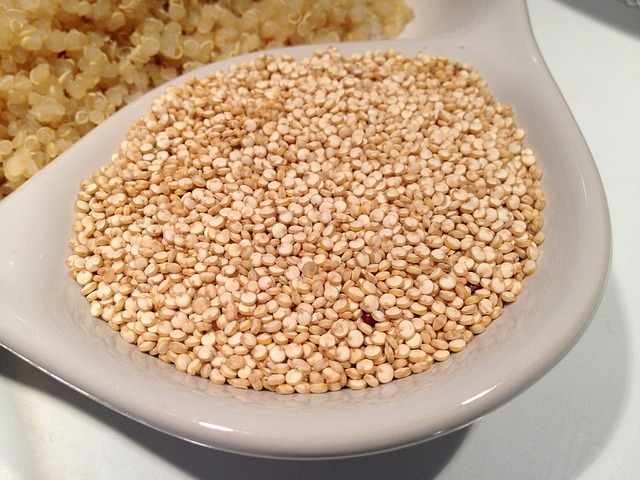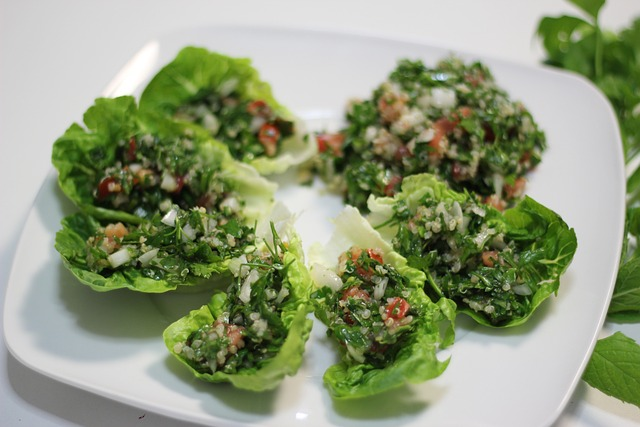All About Nutrients Quinoa: Health Benefits, Nutrition Facts & More
Quinoa is a nutritious and delicious whole grain that has been gaining popularity in recent years. As an excellent source of protein, minerals, and vitamins, quinoa has many health benefits and can be part of a healthy diet.
In this article we will explore the nutrition facts, potential health benefits, and how to cook quinoa and incorporate it into your diet. We will also look at the different types of quinoa available and some recipes to try.
Discover the amazing possibilities that come with quinoa – get ready to enjoy this superfood!
Nutrient Profile
Quinoa is a nutritious powerhouse that’s been gaining traction in recent years. Packed with protein, containing all nine essential amino acids, it’s a complete meal in itself! It also boasts dietary fiber, vitamins and minerals – plus it’s low in fat and full of antioxidants and healthy fatty acids. Not to mention its gluten free status – quinoa provides many of the nutrients found in gluten-containing grains without any of the side effects. All this makes quinoa an ideal addition to any diet for its impressive nutrient profile and potential health benefits.
Protein
Quinoa is a superfood, packed with an abundance of protein and all nine essential amino acids. This makes it a complete protein, providing your body with the necessary building blocks for proper functioning.
Tyrosine, one of these essential amino acids found in quinoa, is key to healthy hair growth. It can help strengthen the hair shaft, repair damaged strands and even promote new growth – making it a must-have for any beauty routine! Protein also plays an important role in producing enzymes, hormones and other vital chemicals – so why not give your body a boost by adding quinoa to your diet?
Fiber
Quinoa is high in dietary fiber, a nutrient that can bring numerous health benefits. Eating quinoa may cause an upset stomach due to its high fiber content, but this is beneficial in the long run. Fiber helps balance blood sugar levels and keeps you full for longer. It also reduces cholesterol levels and improves digestive health – so why not give it a try?
Vitamins and Minerals
Quinoa is a nutritional powerhouse, packed with essential vitamins and minerals. One cup of cooked quinoa contains a whopping 0.2 mg of folate – that’s 13% of the recommended daily intake for adults! It also has an impressive 77% of the recommended daily intake for females and 58% for males in manganese content. But what about its potential health benefits? Vitamin E is present in quinoa, which can reduce inflammation and protect cells from damage. Riboflavin is also found in quinoa, helping to treat anemia. Plus, it’s full of other important nutrients like magnesium, zinc, iron and phosphorus!
Health Benefits
Quinoa is a nutritional powerhouse, packed with protein, fiber and essential vitamins and minerals. It’s naturally gluten-free too – making it a great choice for those on a gluten-free diet. But why else should you be eating quinoa?
Vegetarians and vegans will love quinoa as it provides 8 grams of protein per cooked cup! Plus, it’s rich in folate, magnesium and copper – all important nutrients for any plant-based eater. Quinoa is also an excellent substitute for grains like rice or pasta in salads or side dishes.
But that’s not all: studies have found that the antioxidants present in quinoa can help fight free radicals, which may reduce the risk of cancer developing. The high fiber content can also promote a healthy digestive tract – another way to reduce your risk of cancer!
Quinoa is even healthier than rice, providing more protein, fiber and other beneficial nutrients than its grainy counterpart. And if you’re looking for something safe to feed babies aged 8 months or older, then look no further: quinoa is easy to digest and full of essential vitamins and minerals needed by growing bodies!
Reduces Inflammation
Quinoa is rich in powerful antioxidants that can help reduce inflammation and protect cells from damage. Sprouting quinoa increases its nutrient absorption, breaking down insoluble fiber to make the nutrients more available. Quercetin and kaempferol have anti-inflammatory properties which can guard against chronic conditions such as cancer, heart disease, diabetes, and skin cancer.
Helps Control Blood Sugar
Eating quinoa can be a nutritious boon for people with diabetes and other metabolic health issues. It helps to stabilize blood sugar levels due to its low glycemic index and high iron and magnesium content. A 2016 Brazilian study even found that quinoa improved glycemic control and insulin sensitivity in those with type 2 diabetes and hypertension.
For those living with celiac disease or gluten intolerance, quinoa is an ideal choice as it’s naturally gluten-free. Plus, its flour can be used as a substitute for wheat flour in baking or cooking – making it the perfect option for anyone following a gluten-free diet!
Lowers Cholesterol
A study published in 2018 – but what did it show? Consuming quinoa daily for 12 weeks can help reduce triglyceride levels, like a key unlocking the door to better health. The results showed that those consuming two cups of cooked quinoa daily had significant reductions in triglyceride levels compared to other groups.
Quinoa is also a good source of dietary fiber, helping lower cholesterol and promote feelings of fullness. Plus, it is rich in omega-3 fatty acids, which have been linked to improved cardiovascular health. So why not give this superfood a try?
Quinoa Risks
Quinoa is a naturally gluten-free grain that’s becoming increasingly popular for its health benefits. Have you ever wondered what the potential risks of eating quinoa are? Stomach irritation, possible damage to small intestine, and upset stomach are some of the issues associated with consuming too much quinoa. If you have celiac disease or a sensitivity to gluten, it’s important to make sure your quinoa is certified gluten free and watch out for quinoa flakes which may be made from wheat and other cereal grains. Additionally, oxalic acid found in quinoa has been linked to an increased risk of kidney stones – so if you have a history of kidney stones it’s best to talk to your doctor before consuming it. Saponins found in chenopodium quinoa can also cause stomach irritation and possibly damage the small intestine – so if you experience any digestive issues after eating, get in touch with your healthcare provider for advice on managing discomfort.
But don’t let this put you off! Quinoa still offers many important nutrients and benefits when eaten in moderation and with caution – making it a great addition to a healthy diet. Whether white, red or black, remember that being mindful of the potential risks associated with consuming quinoa is key!
Quinoa in the Diet
Quinoa is an ancient grain, a nutritional powerhouse that’s recently surged in popularity. Why? It’s gluten-free and packed with essential amino acids – plus it can be used to create delicious and nutritious meals from salads to soups.
Curious about quinoa recipes? Look no further than online health benefit guides for porridge, soup, stew, salad, muffins, pancakes and more! Quinoa is an excellent source of dietary fiber, so why not start your day off right with it? Or enjoy it for lunch or dinner – the possibilities are endless!
Adding quinoa to your diet is easy: you can find it in most health food stores as a seed or flour/flakes. Cook before eating (it only takes a short time!) then store in an airtight container in the fridge for up to 6-7 days. Busy individuals and families will love how simple yet nutrient-dense incorporating quinoa into meals can be!
How to Cook Quinoa
Since quinoa’s surge in popularity, many adaptations of the ancient grain have appeared. Quinoa flour is an excellent substitute for traditional wheat flour in gluten-free baking. Quinoa flakes, made by steaming quinoa and rolling it into thin, near-transparent flakes, can be cooked more quickly than the seeds. White, black, red, and yellow quinoa are all available in health food stores.
Quinoa is a safe food for people with celiac disease or non-celiac gluten sensitivity, as it is gluten-free. Those suffering from such conditions can easily incorporate quinoa in their diet. However, it is important to read labels carefully to ensure no cross-contamination. Quinoa provides many benefits to a gluten-free diet, including good digestibility and essential amino acids.
Quinoa can be roasted for maximum taste enhancement. Fry it on a medium-low heat for about 5 minutes, stirring constantly. Some types of quinoa need to be rinsed before cooking to remove saponins, which have a bitter flavor.
Recipes
Quinoa is incredibly intriguing – an ancient grain from South America, pronounced keen-wah. It’s a nutrient powerhouse with countless health benefits and can be used to make pilafs, porridges, soups, stews, salads, burrito bowls and casseroles. For something extra special try quinoa milk: blend cooked quinoa with water, dates and cinnamon for a creamy sweet treat! And if you’re looking for more ways to enjoy this superfood, there are plenty of options like quinoa chips or pasta or even chocolate! Quinoa is the perfect addition to any vegan or plant-based diet – nutritious and delicious!
Summary
Quinoa has long been valued as a highly nutrient-rich food, and its benefits extend far beyond those who may be gluten-free. Containing essential amino acids, fiber, vitamins and minerals, antioxidants, and fatty acids, quinoa is an ideal addition to any diet. It offers numerous health benefits that come in many forms, whether it’s cancer prevention, improved digestion, or reduced inflammation.
Quinoa also helps to regulate blood sugar levels, lower cholesterol, and even provide essential nutrients for babies. Lastly, since quinoa is a versatile whole grain, it can be easily incorporated into busy lifestyles, making it a great choice for tasty and nutritious meals.
All of these benefits make quinoa an undeniable superfood that should be included in everyone’s daily diet plan.
Frequently Asked Questions
What is the nutritional value of quinoa?
Quinoa is an excellent source of nutrition, containing protein, vitamins, minerals, and fiber. It is a complete protein, providing all the essential amino acids, plus iron, magnesium, and potassium.
Additionally, it contains vitamin E and holds many health benefits, making it an excellent dietary choice.
Is quinoa actually better for you than rice?
Quinoa is a healthier alternative to rice as it contains more vitamins and minerals, has a higher protein content and a lower glycemic index. Additionally, quinoa is gluten-free, which makes it suitable for individuals with celiac disease or food allergies.
Overall, quinoa is a healthier choice than rice, containing more vitamins and minerals, a higher protein content and a lower glycemic index. Additionally, quinoa is gluten-free, making it suitable for individuals with celiac disease or food allergies.
What are 3 health benefits of eating quinoa?
Eating quinoa regularly can provide numerous health benefits like protecting against inflammation, preventing chronic diseases, reducing high blood pressure and cholesterol, helping to maintain a healthy weight, and providing important vitamins and minerals.
Quinoa’s unique nutritional profile makes it one of the most nutrient-dense and beneficial grains available.
What vitamins is quinoa high in?
Quinoa is an excellent source of several vital vitamins and minerals, including folate, iron, thiamine, copper, magnesium, manganese, phosphorus, and potassium.
This superfood contains a balanced array of essential vitamins and minerals, making it a great choice for health-conscious eaters.
Is quinoa better than rice?
Overall, quinoa is nutritionally superior to rice, offering more protein, fiber, and micronutrients. Quinoa is also gluten-free, making it a safer option for those with celiac disease or gluten sensitivity.
Ultimately, both quinoa and brown rice can be part of a healthy diet. Sep 20, 2019. While both quinoa and rice offer nutritional value, quinoa edges out brown rice as the healthier choice with greater amounts of dietary fiber, protein, and micronutrients. It is also a complete protein source, while brown rice is not. Therefore, quinoa is generally better than rice nutritionally speaking.










